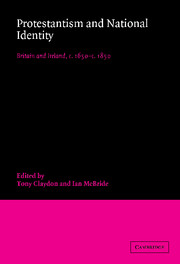Book contents
- Frontmatter
- Contents
- List of contributors
- Acknowledgements
- List of abbreviations
- Introduction
- England
- 2 ‘I love my King and my Country, but a Roman catholic I hate’: anti-catholicism, xenophobia and national identity in eighteenth-century England
- 3 Confessional state or elect nation? Religion and identity in eighteenth–century England
- 4 ‘To protect English liberties’: the English nationalist revolution of 1688–1689
- 5 A history of variations: the identity of the eighteenth-century church of England
- Britain and Ireland
- Britain, Ireland and the world
- Index
4 - ‘To protect English liberties’: the English nationalist revolution of 1688–1689
Published online by Cambridge University Press: 16 October 2009
- Frontmatter
- Contents
- List of contributors
- Acknowledgements
- List of abbreviations
- Introduction
- England
- 2 ‘I love my King and my Country, but a Roman catholic I hate’: anti-catholicism, xenophobia and national identity in eighteenth-century England
- 3 Confessional state or elect nation? Religion and identity in eighteenth–century England
- 4 ‘To protect English liberties’: the English nationalist revolution of 1688–1689
- 5 A history of variations: the identity of the eighteenth-century church of England
- Britain and Ireland
- Britain, Ireland and the world
- Index
Summary
‘A nation is composed of private men; all brought up very near in the same customs, and instructed much by the same sort of teachers: the Prince must take them as he finds them’, explained one pamphleteer in the immediate wake of the revolution of 1688–9. ‘He that would introduce monarchy into Holland, which will drown for liberty at any time, or settle a republic in France which will and does so eagerly fight for slavery, will have a task of no small performance.’ One of the earliest historians of the revolution began his account in a similar tone. ‘Certain it is’, the author of the History of the late revolution observed, ‘that nothing more provokes and irritates a nation born to freedom, as the English nation is, than attempts to deprive them of the ancient constitutions of their liberty.’ What these commentators had in common was a concurrently local and European understanding of 1688. Whilst they celebrated developments within England, they saw recent events within the context of a Europe composed of nations like their own. For them, the revolution had preserved things the English nation held dear: but it had taken place in a continent composed of other peoples, each with their own characteristics and traditions to defend. In 1688, there was a widespread English nationalism, forged in a cosmopolitan context.
This simultaneously cosmopolitan and nationalist view of 1688–9 sit sin uneasy tension both with traditional accounts of the origins of nationalism and with the historiography of the revolution itself. Those historians who are willing to allow for the existence of an early modern nationalism insist that it developed out of an antagonism to, not a constructive engagement with, European nations.
- Type
- Chapter
- Information
- Protestantism and National IdentityBritain and Ireland, c.1650–c.1850, pp. 75 - 104Publisher: Cambridge University PressPrint publication year: 1998
- 24
- Cited by



